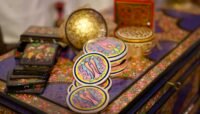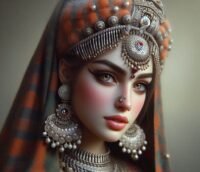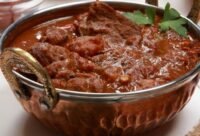Habba Khatoon, a legendary poetess from Kashmir, remains one of the most cherished figures in Kashmiri literature and folklore. Her poignant verses and deeply emotional poetry continue to resonate with lovers of poetry and literature alike. Born in the 16th century, her life story is one of love, loss, and lyrical brilliance, making her an enduring icon of Kashmiri culture.
Habba Khatoon Real Name and Early Life
Habba Khatoon was born as Zoon (which means “moon” in Kashmiri) in a small village in Kashmir. From a young age, she exhibited exceptional intelligence and a natural flair for poetry. Her early life was marked by hardship, as she was married off at a young age into an unhappy marriage. However, poetry became her refuge, and she found solace in composing verses that expressed her emotions and the pain of her circumstances.
Her fate changed when she caught the attention of Yusuf Shah Chak, the ruler of Kashmir. Enchanted by her beauty and poetic genius, he married her, and she was given the title “Habba Khatoon,” meaning “Dear Khatoon” or “Respected Lady.” This marriage brought her into the limelight, and she became a celebrated poetess of the royal court.
Famous Habba Khatoon Poetry/Poems
Habba Khatoon’s poetry is deeply personal, filled with themes of love, longing, separation, and nature. Unlike the Persian-influenced poetry that dominated Kashmiri literature at the time, her verses were rich in native Kashmiri expression, making them deeply relatable to the common people.
Here are some of her most famous poetic themes:
1. Love and Yearning
Much of Habba Khatoon’s poetry revolves around love, particularly the longing for her beloved. Her poems often reflect her deep love for Yusuf Shah Chak and the pain of their separation when he was exiled by the Mughal emperor Akbar.
One of her most famous verses expresses her sorrow:
“Me cham me gov pamposh, me kosti wanay” (“I am like a lotus flower, my beloved has left me.”)
This melancholic tone runs through much of her poetry, resonating deeply with those who have experienced love and loss.
2. Nature and Emotion
Her poetry is known for its vivid imagery and deep connection to nature. She often used elements like rivers, flowers, and mountains to express her emotions. Her words painted pictures of Kashmiri landscapes, making them more than just expressions of sorrow—they were tributes to the land she loved.
3. Feminine Perspective
At a time when women’s voices were rarely heard in literature, Habba Khatoon’s poetry stood out for its emotional depth and authenticity. She wrote from a woman’s perspective, speaking of personal desires and heartbreaks, breaking the norms of her era.
Some of her notable poems include:
- “Tsolhama Roshay” (Have You Forgotten Me?)
- “Gami Piya More” (O My Love, Where Are You?)
- “Me Chu Mashouq Tchi Makhmoor” (My Beloved is Intoxicated)
- “Ba Chus Shahzadi” (I Am a Princess) – This poem expresses her confidence and self-worth despite her personal sorrows.
- “Yemberzal Myani Dilbaro” (My Beloved is Like a Narcissus) – In this poem, she compares her lover to the beautiful narcissus flower, symbolizing admiration and longing.
- “Rinde Poshmal Gindine Draay” (The Garden of Roses Has Been Destroyed) – A sorrowful reflection on love lost and the fleeting nature of happiness.
These works continue to be sung and recited, keeping her legacy alive even centuries later.
Habba Khatoon’s Death and Legacy
Habba Khatoon’s life took a tragic turn when her husband, Yusuf Shah Chak, was betrayed and exiled by the Mughals. She was left alone, abandoned, and heartbroken. She spent the rest of her life wandering in the forests and valleys of Kashmir, lamenting her lost love through poetry. It is believed that she died in solitude, mourning the fate of her beloved and her people.
Though her exact date of death is unknown, her presence in Kashmiri culture remains immortal. Her poetry continues to be a source of inspiration, with musicians, scholars, and writers drawing from her verses. Her songs have been adapted into folk tunes and modern renditions, ensuring that her voice still echoes through the valley.
The Enduring Influence of Habba Khatoon
Habba Khatoon’s poetry is not just a relic of history but a living part of Kashmiri culture. Her influence can be seen in:
- Music: Her poems have been turned into soul-stirring Kashmiri folk songs.
- Literature: She remains a significant figure in Kashmiri literature, often studied in academic settings.
- Cinema and Drama: Her life has inspired plays, television serials, and even discussions about feminism and women’s contributions to poetry.
Today, she is remembered as the “Nightingale of Kashmir,” a poet whose words capture the beauty and sorrow of her homeland. Through her verses, Habba Khatoon remains an eternal voice of love, loss, and longing.

Paper Mache Kashmir – The Elegance of Handmade Art

Habba Khatoon And Her Heartfelt Poetry of Love And Loss

Traditional Kashmiri Jewellery – A History Worn With Pride

The World of Kashmiri Saffron – Benefits And Where To Buy The Real Deal

Kashmiri Shawls – A Guide to Types, Prices, and Where to Buy Them in Srinagar



